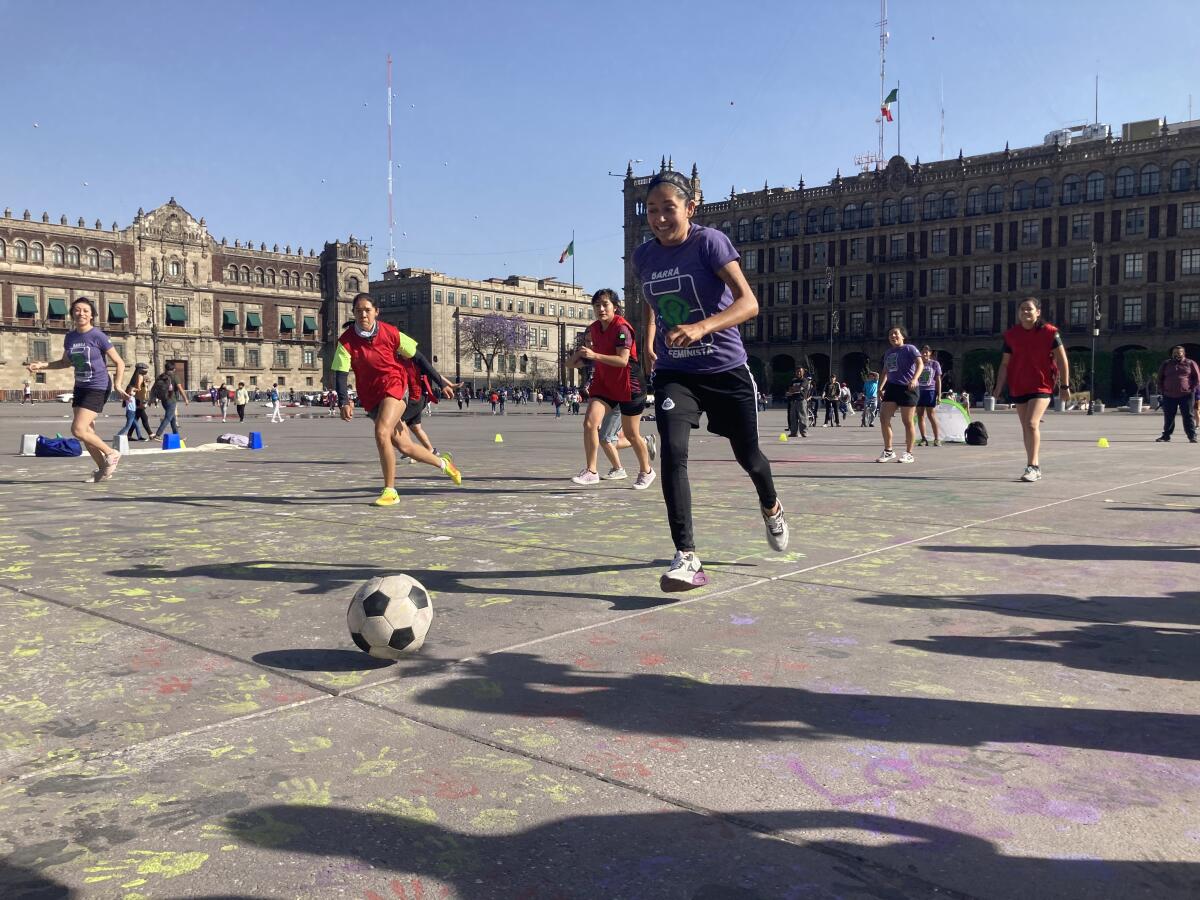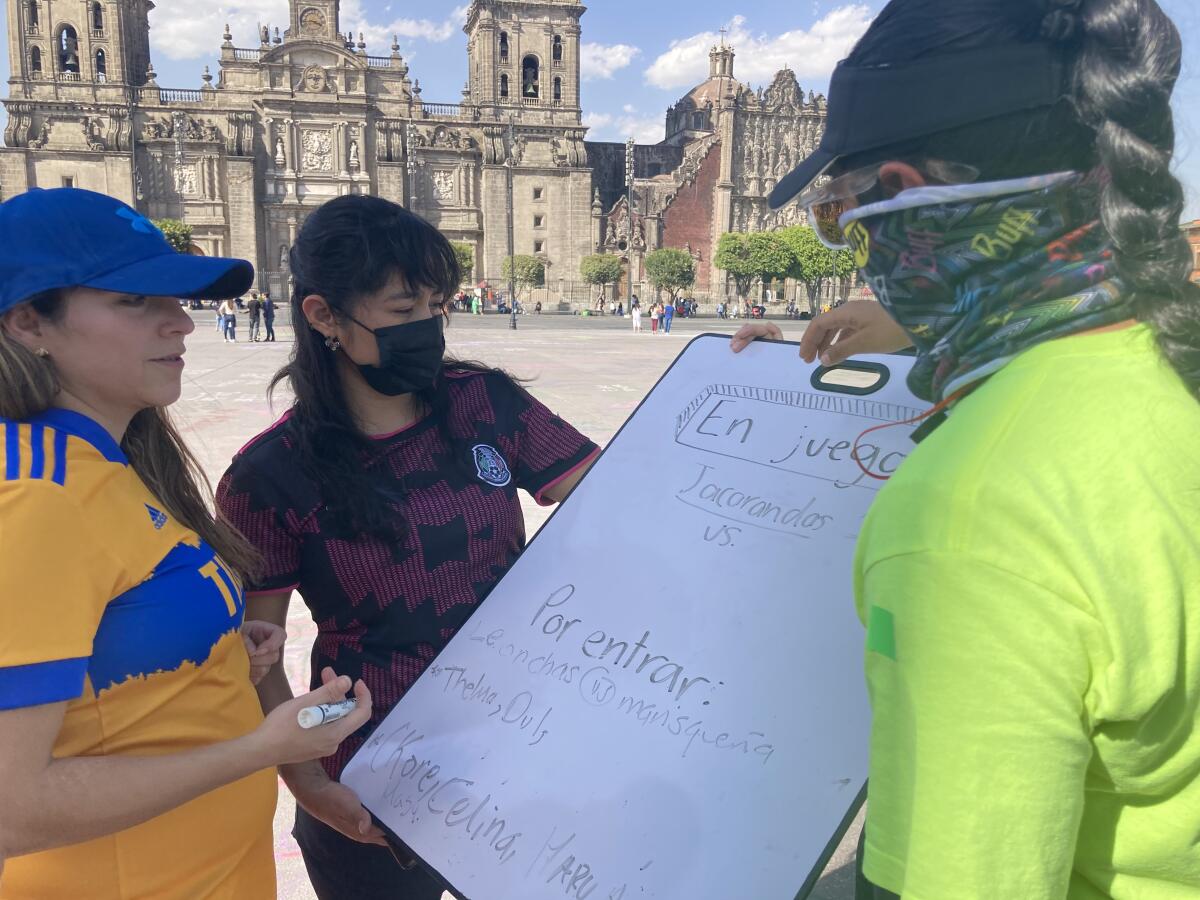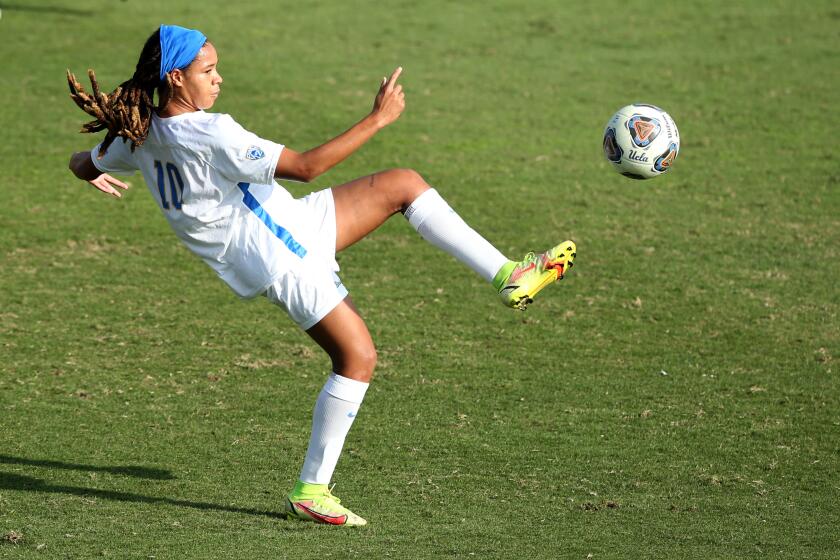To protest machismo, women played soccer in Mexico City’s central square

- Share via
MEXICO CITY — The women arrived at Mexico City’s central square bearing nets, yellow cones and masking tape. They quickly improvised a soccer field.
There was no referee and the field was only about 50 feet long. But with the National Palace and the Metropolitan Cathedral as their backdrop, the women began to play soccer.
The five-on-five tournament, which attracted local news coverage and a couple of dozen curious onlookers, was a protest against male domination of the sport.
“There’s a different way to play the sport that’s contrary to the machista practices, the discrimination, which promotes companionship and solidarity,” said Pilar Tlatempa, a 26-year-old member of Barra Feminista, one of several women’s soccer groups that organized the event, held Wednesday afternoon.
The square, known as the Zocalo, was still covered in feminist graffiti from the International Women’s Day protest a day earlier.
Hampered by societal machismo and a long tradition of ambivalence about females participating in professional sports, women’s soccer has long struggled to gain a foothold in Mexico, where the men’s game is the national pastime.
In 2018, one of the women trying to change that, Marbella “Mar” Ibarra, was found beaten to death and wrapped in plastic in the city of Rosarito on the Baja California Peninsula.
Ibarra, the owner of a beauty salon in Tijuana, had used her profits to bankroll one of Mexico’s first amateur women’s teams. Her killing occurred shortly after her team formed a partnership with the Xolos of Tijuana to create the country’s first women’s professional club.
Mexico’s women’s league, the Liga MX Femenil, was launched in 2017 and has shown remarkable growth in recent seasons.

Players initially made $25 to $100 a month, wages so meager that a government investigation last fall resulted in fines of $8.9 million against eight individuals and 17 clubs for reasons that included imposing wage caps for female players.
This season, according to the Mexican financial publication El Economista, the average monthly pay is about $1,225.
With the ability to offer salaries many times that, Mexican teams have been able to lure some U.S. players away from the more established U.S. women’s league. Former UCLA standout Mia Fishel, a first-round draft pick of the Orlando Pride in December, was the first big name to jump, signing with the Tigres of Monterrey this winter.
When Mia Fishel left school after her junior year to turn pro, everyone assumed she was going to the NWSL. She chose Mexico’s Liga MX Femenil instead.
The average regular-season attendance of the women’s league games has never risen above 2,250, but Mexico’s 2018 Clausura tournament drew a crowd of 51,211, the largest for a women’s club match in the Western Hemisphere.
“I could never have imagined it,” Shelma Cerrillo, a 34-year-old member of the Barra Feminista, said of the creation of the women’s league. “It gave me a lot of pride and a lot of joy.”
Barra Feminista, which has more than 100 members, was formed in 2020. Tlatempa said it aims to bolster support for the women’s league, whose matches are attended by men who shout sexual taunts at the players.
The female fans come armed with their own chants, including, “Where are they? Where are they? The directors that are going to give equal pay!”
The players at the Zocalo contrasted the peacefulness of their game to a riot Saturday at a men’s soccer game in the state of Queretaro that left 26 people hospitalized. They lamented that the decision by Mexican soccer authorities to ban fans from matches also includes the women’s league.
Mexico’s Liga MX announces significant sanctions in the aftermath of the bloody riot that occurred at the Atlas versus Querétaro match Saturday.
They also recalled the discrimination that they’ve faced in the sport. Fer Aguirre, 27, said that growing up she could play soccer only in the street with her neighbors because “in school it was understood that girls didn’t play.” Others said they’re lucky if men pass them the ball.
“There’s a lot of contempt,” said Frida Toimil, 28, who co-founded her own women’s soccer group called Morras Futboleras. “It’s not outward aggression.”
None of that was present on Wednesday.
The players sweated as Toimil narrated the game over a public address system. “Look at that strength, that concentration!” she said as one woman scored a goal.
The mood was relaxed. At one point, a popsicle vendor wandered onto the field.
“Sir, can you please get off the field?” said Toimil, drawing laughs.
Ricardo Calderon de la Barca Hernandez, a taekwondo instructor passing through the Zocalo, stopped to watch.
“They play really well, but the cause is more important,” he said. “Women are working hard to win spaces that were prohibited.”
Miller reported from Mexico City and Baxter from Los Angeles.
More to Read
Sign up for Essential California
The most important California stories and recommendations in your inbox every morning.
You may occasionally receive promotional content from the Los Angeles Times.















